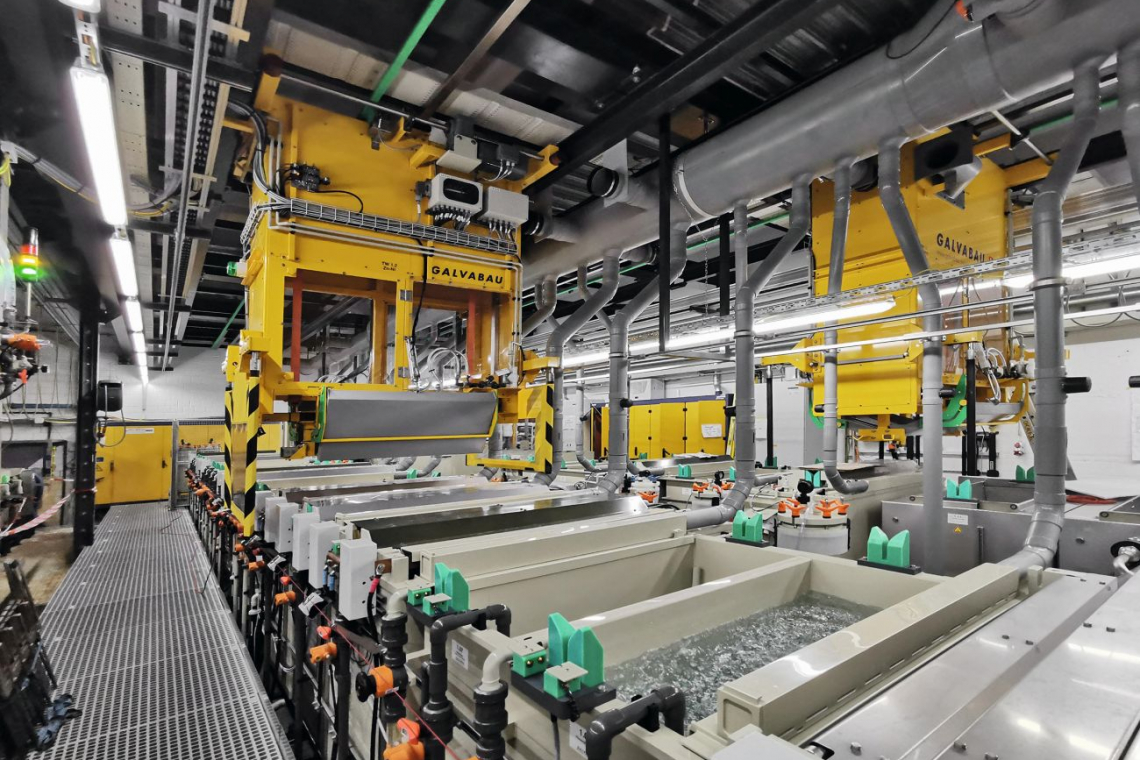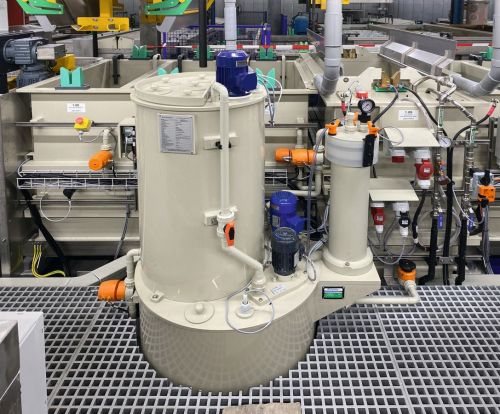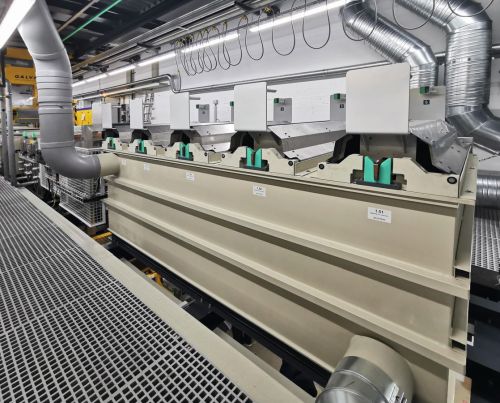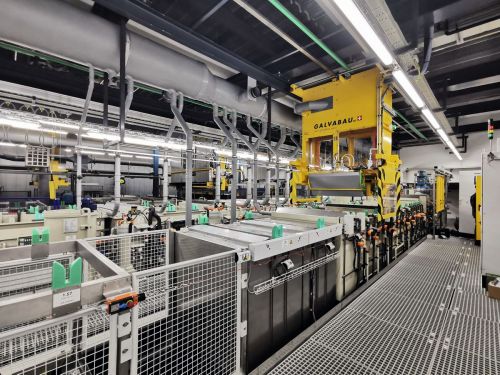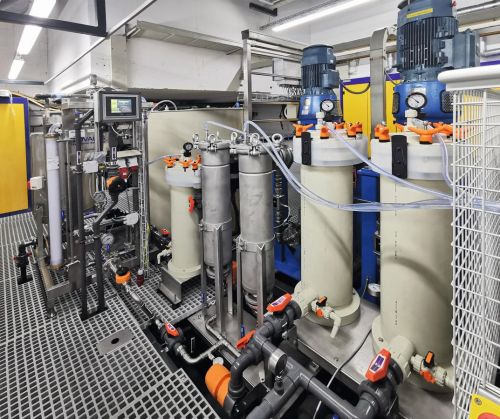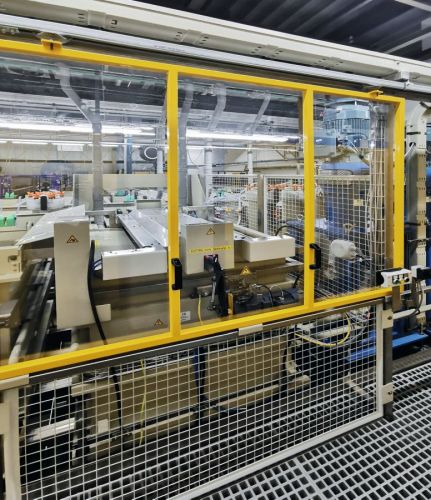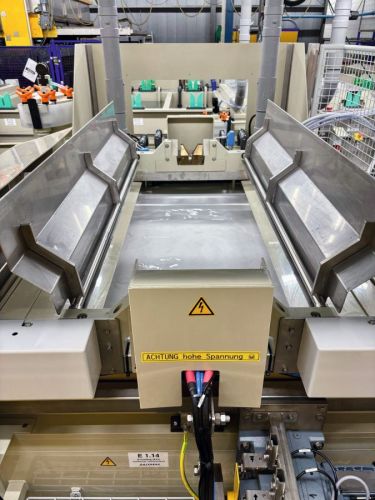The Swiss plant manufacturer Galvabau has realized a challenging project for Pilatus Flugzeugwerke AG in Stans/Switzerland. In future, the zinc-nickel and e-coating production processes will be carried out on two independent electroplating systems.
The project placed very high demands on Pilatus and Galvabau for the following reasons in particular:
- Very tight space conditions, which necessitated installation on two levels
- Integration of a new type of e-coating process
- Assembly and installation of the two new systems directly next to the existing anodizing system without interrupting its production
The two new systems were installed parallel to the existing anodizing system. The components are loaded and unloaded on the first floor. From there, the product carriers are lifted to the process level and guided through the individual process baths. Due to the high number of process baths required, it was necessary to extend the system above the loading and unloading station on an additional intermediate floor.
System for e-coating
The e-coating process, also known as anodic dip coating (ATL), is an electrochemical, industrial coating process with certified approval for the aerospace industry. Due to its approval, the process is increasingly being used in this industry. The technology is similar to electroplating, with the difference that the coating is organic rather than metallic. Metallic components are immersed in a water-based immersion bath (negatively charged paint solution with resin, pigments and additives). When the component is lowered into the immersion bath, it is automatically connected to the positive pole of a rectifier (anode). When the voltage is applied and the resulting current flows, the resin in contact with the component becomes more acidic and coagulates on its surface. The coating thickness can be controlled via the rectifier voltage and the dwell time in the immersion bath. The voltage is always kept at the set target value during the coating process thanks to the automatically controlled, constantly changing current flow. The voltage can be set to a maximum of 400 V.
Anodic dip coating is characterized by
- Uniform coating formation, even on complex geometries and in cavities
- Excellent corrosion protection
- High reproducibility of the process
Thanks to a closed-loop system, waste water pollution is minimized: The coating lacquer is continuously separated from the rinsing water and the treated water (permeate) is fed back into the subsequent rinsing stages.
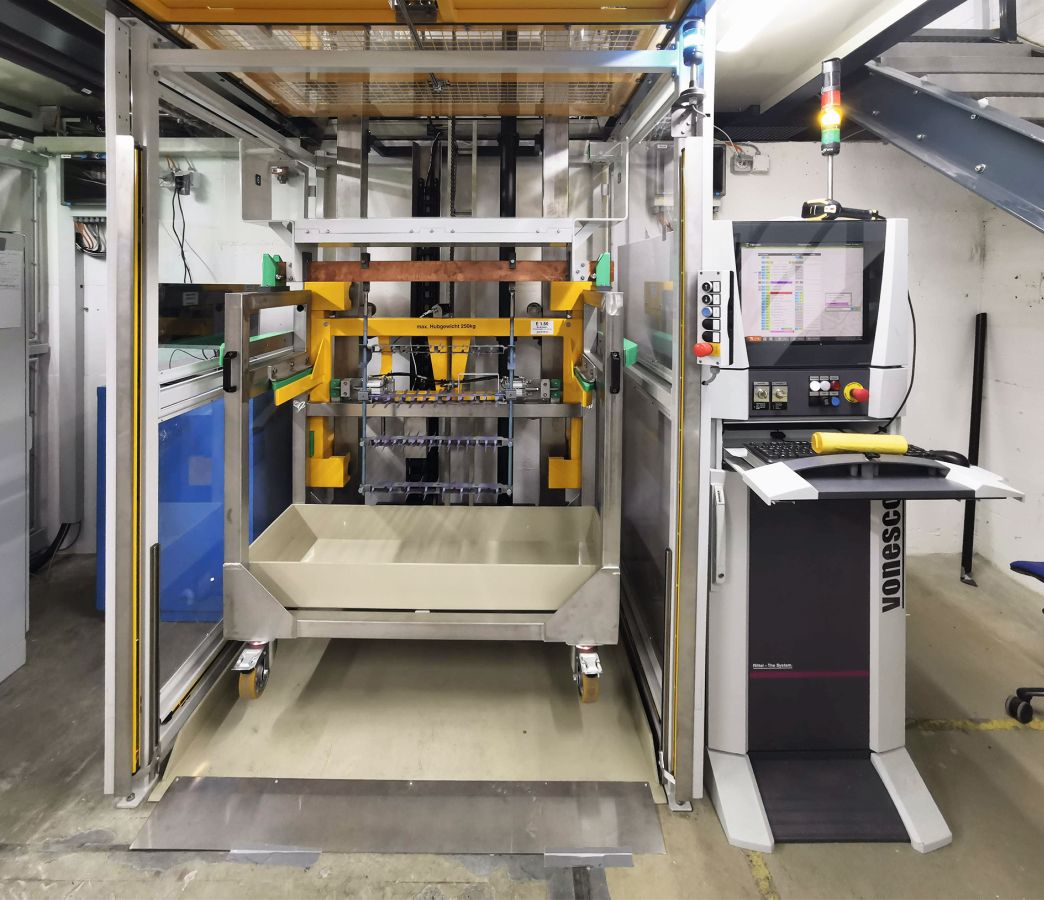 Loading & unloading station with docking trolley and lifting device
Loading & unloading station with docking trolley and lifting device
Special features of the e-coating process bath:
- Flow-optimized bath to avoid fluidic dead zones - deposits are avoided
- Two self-sufficient, external submersible pumps (delivery volume approx. 10 times the bath volume each) with return lines into the bath via a serductor system. The rotation speed of the pump impellers is crucial in order not to destroy the paint.
- 3D product movement through two independent, controllable and overlapping swivel devices
- Ultrafiltration system for separating the coating lacquer and rinsing water
- Stacking container for cleaning & maintenance work
- Safety devices (contact protection) for high voltages
- Operation of the bath via an uninterruptible power supply (UPS) for maximum safety in the event of power failures - the coating lacquer remains fully functional.
After passing through the e-coating process and the subsequent rinsing stages, the coating on the components has a basic compressive strength and is therefore already hand-tight. It reaches its final compressive strength in the circulating air dryer at 120 °C with an integrated special filter, which ensures that no foreign particles get onto the component surface during the drying process.
Before being removed from the loading and unloading station, the components are cooled in an encapsulated tank with fresh, filtered supply air.
Plant for zinc-nickel & passivation
Galvanic zinc-nickel coating is widely used in the automotive industry. In recent years, it has also gained importance in the aerospace industry, as it represents an environmentally friendly and high-performance alternative to the traditional cadmium process.
For the zinc-nickel bath, a specially developed dissolving station for zinc anodes has been integrated, which has the following features:
- Sophisticated and ergonomic handling of the zinc anodes
- Regulation of the zinc content via a variable immersion depth of the zinc anodes, this is achieved by the upper and lower tanks by means of level control and emergency drain function.
- Good mixing in the two tanks with filtered return to the process bath
- Also for small active bath volumes and product throughputs
In the system, components made of stainless steel, low-alloy or unalloyed steels and non-ferrous metals can be passivated after zinc-nickel coating or - if necessary - exclusively passivated. Processing takes place as rack or barrel goods.
Equipment features of both systems
Both systems have a bath lid system and transport trolley extraction for a massive reduction in the total amount of exhaust air. The transport trolleys are also equipped with drip trays and an innovative personal protection system.
The systems are controlled and regulated by an innovative and user-friendly high-tech control system. The software offers the system operator every conceivable option for individually setting and checking all process parameters. The high QR requirements of the aerospace industry are met with the recording and logging of all parameters and their evaluation options.
Swiss quality and precise planning
The successful realization of such complex projects begins with a clear strategy: Galvabau relies on the active involvement of all stakeholders right from the start. Open communication and cooperation based on partnership ensure that all interests are taken into account.
The focus is on a consistent focus on Swiss quality - with products and components from Switzerland or Europe wherever possible. Thanks to precise planning and a holistic project approach, the two systems were realized with high availability and low operating costs. This not only achieved a technically convincing result, but also ensured economically sustainable operation for years to come.
The systems were handed over to Pilatus Flugzeugwerke on schedule so that the qualification of the processes could be initiated immediately. "The e-coating process is new territory for us, but the technical solutions that are used have fully convinced us. We particularly appreciate the fact that we were actively involved in the decision-making processes. The choice of supplier turned out to be the right one," commented Yaşar Kütükçü, Team Leader Plating & Inspection, on the project implementation.

